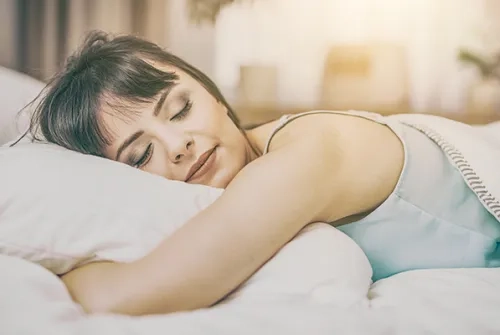Alo Yeditepe
Alo Yeditepe
8 Tips for Better Sleep
Yeditepe University Koşuyolu Hospital Neurology Specialist, who said that depriving of the order of working life due to the Coronavirus Outbreak, being constantly passive at home, and intense stress, in general, are inevitably disturbing sleep, listed the suggestions that will benefit from this process for sleep:
Do Not Consume Foods and Drinks that Disrupt Sleep
Because caffeine (coffee), and nicotine (cigarettes) keep them awake, those who drink these substances take longer to fall asleep. Therefore, in order to have a comfortable night, you should not consume these substances 3 hours before sleeping.
Stay Away From Alcohol
Although many people think that alcohol will help to sleep, our expert said that alcohol will create a negative result by impairing the quality of sleep. “Even if you fall asleep quickly when alcohol is taken, it will cause short awakenings during the night and waking up early and tired in the morning,”
Create Your Sleep Routine
Especially during the quarantine process, we are in, although the daily routine has changed, it is important that the sleeping and waking hours are as regular as possible. In this way, the deterioration of the biological rhythm can be prevented. Waking up at the same time every morning is another good way to regulate sleep.
Sleep at Night, Not During the Day, and Do Not Take Daytime Naps
Saying that daytime sleep is in no way the same as nighttime sleep, our expert stated: “Sleep should be done at night, it is necessary to wake up after the day is bright, and definitely not to get up too late. The two hours you sleep during the day are not the same as the two hours you sleep at night, and the daytime sleep cannot clearly rest the person.” Do not sleep for a long time during the day. If there is irresistible sleepiness, sleep once a day and for less than 20 minutes, this is refreshing. Prolonged sleep can cause dizziness. There should be no naps after three o'clock in the day.”
Do Not Exercise During Bedtime
People who do not get tired or do not exercise may have difficulty falling asleep at night. Regular exercise helps people sleep better. However, it is necessary to determine the best time to exercise. It is necessary to leave at least two hours between bedtime and exercise, and exercise should be done in the afternoon or early evening. Sports done very early in the morning are also not appropriate.
Ensure Sleep Hygiene
Explaining that many details from the temperature of the bedroom to the light used will disrupt sleep hygiene, our expert said: “The bedroom should be as quiet as possible, the light is noticeable even if the eyes are closed and can disturb sleep, so the curtains of the bedroom should be thick and lightproof, there should be no television or computer. Cell phones should not be used in bed.”
Do Not Wait in Bed For Sleep
Staying in bed for a long time while waiting for sleep makes it difficult to sleep. You should only go to bed when you are asleep. If you cannot fall asleep within 20 minutes, you should get out of bed and wait outside the bed by doing a passive activity such as reading a non-exciting book or listening to calm music.
Pay Attention to What You Eat Before Bed
Our expert, who said that you should not go to bed very hungry and should not eat heavy meals close to bedtime, also added: “Eating should be left at least 3 hours before the time you want to sleep and light things should be eaten in the evening. When you cannot sleep, you should not eat anything to linger. In addition, foods and beverages that will impair sleep quality (such as foods that cause heartburn or gas, tea, coffee, energy drinks, etc.) should be avoided in the evening.
This content was prepared by Yeditepe University Hospitals Medical Editorial Board.
”
See Also
- What is Parkinson's Disease? What are the Symptoms of Parkinson's Disease?
- Brain Health is Determined by Lifestyle, Not Age!
- Pudendal Nerve Compression
- Curiosities About Cerebral Palsy
- The Use of Botox in Neurological Diseases
- Current Approach to Dizziness Treatment: Balance Perception Rehabilitation
- What is a Stroke (Apoplexy)?
- How to Protect Brain Health?
- Epilepsy Symptoms, Diagnosis and Treatment Methods
- Multiple Sclerosis (MS) Disease, Symptoms, and Treatment
- What is Myasthenia Gravis Symptoms and Treatment Methods
- Persistent Fatigue of Unknown Cause Could Indicate MS!
- Neurological Involvement
- Lumbar Disc Herniation (Herniated Disc)
- What is Epilepsy?
- 10 Important Myths in Alzheimer's Disease
- Consanguineous Marriage Increases the Risk of Epilepsy 40 Times
- School Stress Invites Sleepwalking
- Daughter-in-Laws Care for Alzheimer's Patients
- Recommendations From The Expert For Migraine Patients
- As Insomnia Increases, Its Harmful Effects on the Immune System Also Increase
- Vitamin D Deficiency Disrupts the Course of MS
- Initial Symptoms of ALS Considered To Be Nerve Compression
- Healthy Microbiota Reduces the Risk of Alzheimer's
- Don’t Risk Your Brain!
- Patients with Refractory Epilepsy May Lose Time Until They Receive a Proper Diagnosis
Alo Yeditepe







